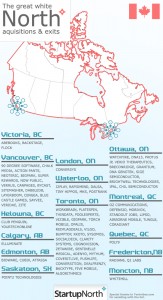2011 was an important year for Canadian Startups.
We had some exits. Over $1bn worth. We needed that. The more important thing is that a lot of those exits were by entrepreneurs who “get it” and who are going to be re-investing in startups here in Canada.
Now we have a handful of funds who have money to deploy. Many of you probably don’t remember the good old days when there was no money to go around. I once saw a startup panhandling on Queen St West to raise money for some Dell servers. No joke.
This was also a big year because it was one of the first in which we saw deals getting done in Canada by US based investors. That’s good because it keeps us all on our toes and it forces local investors to compete on market-driven terms.
The biggest problem now, as far as I can tell, is that we are out of excuses. There is money, talent, and the need to build more quality startups.
So get to work.
In the early days of Democamp there was an obsession with quality. I think it probably stemmed from our (Toronto’s) own insecurity with itself. There was no identity or real history to draw from, so we had to be careful to make sure that everything that came from the community was world class. It wasn’t always but we tried. We need to get really obsessed with the quality of stuff we turn out in Canada in the next year. No more being cheerleaders for mediocre shit. We need to be OBSESSED with setting the bar high.
We need to go a step further now. We need to set the bar for world class. Now is not the time to slow down.
Part of the problem is that we don’t have a single voice to tell our story. Techvibes is doing an amazing job covering EVERYTHING, but it doesn’t have personality. Startupnorth is editorial and a lot of preaching (like this post). That doesn’t help much either. I hope a voice emerges in the next year that has the time and economic model to really tell the story in Canada. It would be good if Mark MacQueen quit his job as a banker and just blogged fulltime. That guy has it right.
If you are still reading, you should put your name in for the founders and funders dinner in toronto in February. I promise it will be good.


